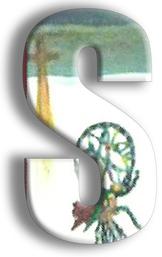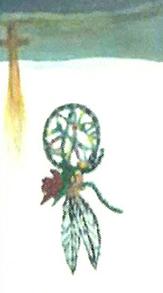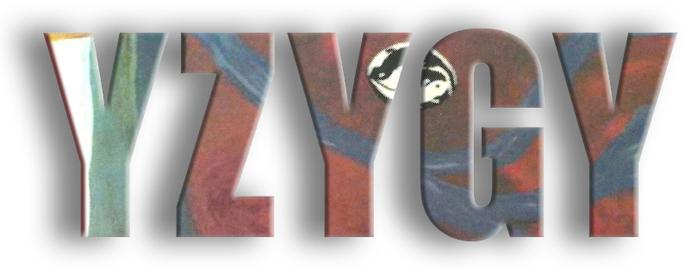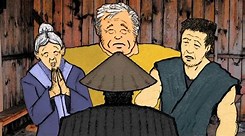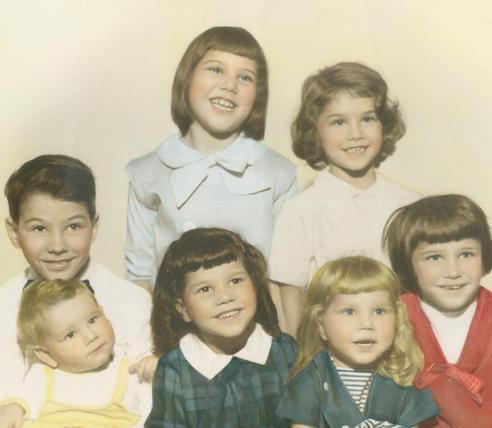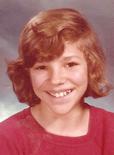MEMOIR LOGO CONCEPT: The aleph and a Sufi mystic inspired my creation and design of the syzygy logo, which I initially based on the symbolism of the yin and yang.
But the concept expanded when I first saw the aleph in Judith Cornell’s
Mandala Healing Kit, My inexplicable attraction to it led me to incorporate it into my logo before I knew what it meant.
I later read that the “Aleph (the first letter of the sacred Hebrew alphabet) embodies the primordial, divine potential of the universe. ... Aleph contains all the universe’s potential and all of its emptiness simultaneously. Aleph represents a dynamic process of movement from unity to diversity and back to unity,” Jennifer Judelsohn, Songs of Creation.
And the mystic poet Rumi inspired me to use the fire and water concept after I read The Question. Here is an excerpt:
“The presence is there in front of me. A fire on the left, a lovely stream on the right.
One group walks toward the fire, into the fire. Another toward the sweet flowing water.
No one knows which are blessed and which are not.
Whoever walks into the fire appears suddenly in the stream.
A head goes under water, and that head pokes out of the fire.”
LOGO ART: Cropped fire and water images from Free Images.
LOTUS LOGO: In spiritual and religious literature, “the lotus is a symbol for the macrocosm and the microcosm, the universe and man. The lotus represents the divinity of the cosmos as well as the divinity of man.
The lotus is the center of the infinite, omnipresent consciousness which connects with the consciousness of the universe. Through the intuition, one of man’s divine gifts, the spiritual student can see the infinite, omnipresent consciousness as the lotus flower within himself.”
LOTUS ART: Courtesy
Homestead, my website service provider. (Temporary art while I design of my own lotus logo.)
TO DOWNLOAD FREE SAMPLE CHAPTER OF SYZYGY:
THE MEMOIR
TO BUY MEMOIR
(Thru Amazon)
THE MEMOIR
CROSSING THE BRIDGE TO SELF
THE WEBSITE
THE MEMOIR
NEW!
©1955 —2021 Syzygy: Crossing the Bridge to Self. All Rights Reserved.
“If you believe in it, you are making it a thing to hang onto. So in a way, then, you see, all belief in God is lack of faith. You’re still clinging and, so long as you’re still clinging, you don’t have faith. Because faith is the state of total ‘letting go.’”
Faith is the bridge between thinking and believing. Faith in our society has become synonymous with ignorance because people use faith to establish a sense of certainty and closure.
It is pretending to know something they do not know. They mistake faith for knowing, thereby closing their minds down around the truth of knowing. They become unable to experience other potentials and other realities. They become selectively ignorant. To close one’s perspective down to possibilities and to latch onto knowing one specific ‘truth’ is to live in a state of ignorance.
To have Faith is to have confidence in or trust in—but to not know. People confuse faith with knowing. This is the Shadow side of Faith, and it presents a problem…. The only certainty in life is uncertainty, and the highest objective ‘truth’ is that ‘truth’ is subjective.
Be curious. Not judgmental.
Faith becomes ignorance when faith becomes proof of knowing. … Faith can only happen in the absence of knowing…Become okay with uncertainty. Pull your teeth out of the idea of ‘truth’ and move instead into a space of curiosity, a state of not knowing. In reality, no one knows what Reality is. To commit to curiosity is to release resistance to the painful things we have confidence in or that we think we know.
Alan Watts, Why a Belief in God Reflects a Lack of Faith
The parable of the Chinese farmer
Clinging to God vs. “letting go, and letting God”
Once upon a time, there was a Chinese farmer who lost a horse—ran away! And all the neighbors came around that evening and said that’s too bad. And he said, “Maybe.”
The next day the horse came back and brought seven wild horses with it. And all the neighbors came around and said, “Why, that’s great, isn’t it?” And he said, “Maybe.”
The next day, his son, who was attempting to tame one of these horses and was riding it, was thrown and broke his leg. And all the neighbors came around in the evening and said, “That’s too bad, isn’t it?” And the farmer said, “Maybe.”
The next day, the conscription officers came around looking for people for the Army. But they rejected his son because he had a broken leg. All the neighbors came around and said, “Isn’t that wonderful!” And he said, “Maybe.”
~~~
When retelling the above story, Alan Watts said, “The farmer steadfastly refrained from thinking of things in terms of gain or loss, advantage or disadvantage, because one never knows….
In fact, we never really know whether an event is fortune or misfortune.... ♂ ♀
Faith vs. Belief
In my 20s, I praised God for my blessings. Sickness, poverty, hardship, scandal, and death fell upon just about every family we knew—but ours—as if we were special.
And then on my 30th birthday, in unrelated situations, both my husband and my mother, my two best friends, were in the hospital in critical condition. I realized then that there was a fine line between being pompous and being grateful.
All of our thoughts, feelings, actions—and our prayers—are energy and can have a powerful influence on the outcome of any situation. But is what we pray for necessarily in our—or our loved ones’—best interest?
Our grandparents started a national prayer chain to save their daughter, who lived another 15 years. But that’s also the number of years that were erased from her memory due to brain damage when it took doctors an hour and 20 minutes to resuscitate her.
The woman who occupied my mother’s body when she awoke from an induced coma was a complete stranger. Her body came home, but my mother never did.
About two years before she died the second time, I had the following dream: Ma and Dad are in an ambulance, and we’re trying to get Ma to the hospital. Then Dad pulls out a gun. Ma says, “Oh, good, you brought the gun,” like she thinks that will protect her. As soon as she says that, he blows her head off.
The dream was vivid and shocking, and I related it to Dad’s refusal to quit smoking when Ma was miraculously released (as a nonsmoker) from the hospital almost three months later. But it was not as shocking as what Dad said when I was visiting them about a year after that dream.
Ma had been sleeping in the living room recliner. I checked her pulse in jest, saying I thought she might be dead, after all she had been sleeping all day.
Dad yelled, “She's been dead for 14 years!” My husband did die 14 years before, and I could not help but wonder who had had the better outcome.
For the next 15 years, Ma’s life was left in the hands of a selfish family (self included)—and a selfish husband, who had the audacity to ponder aloud that God thought he was more special than her, that’s why God took her, instead of him.
I have been skeptical about praying ever since.
Ma always told us that our friends would come and go, but our brothers and sisters would be with us our whole lives. But lately, it seems, the differences between our religious ‘beliefs’ and approach to prayer tell a different story.
Alan Watts, a former priest, interpreted and popularized Eastern religions/philosophies in the West.
In our family chat thread, I began to feel like everyone’s incessant penchant for prayer was becoming a little ridiculous.
But wait, you say, do we just NOT pray? It is hard to NOT pray. It is such an integral, ingrained part of many human psyches that most of us do not even know how to think for ourselves.
Neural pathways have been paved for eons, and it would take an extreme effort to break from the brainwashing of our parents and ancestors, an extreme effort to forge new pathways, new thought patterns. ‘Brainwashing’ sounds like an extreme term, but isn’t that what most of us do? Teach our children (or siblings) to believe as we do, and if they won’t conform, we shut them out. (Sounds familiar to me.)
As I pondered the idea of NOT praying, I was overwhelmed by a feeling of helplessness, like I had no control. But then it occurred to me how we pray, pray, pray to try to influence the outcome of a situation, then if we get the outcome we want, we praise God. If we don’t, we spin it and say it was God’s will—as if it wasn’t from the beginning? And I wondered—when I considered many of my siblings’ fervent, fear-based prayers—where is their faith!
My skepticism only increased when I questioned the sincerity of one of my sibling’s prayers, in its fundamental Baptist, cookie-cutter format, in what appeared to me to be an appeal for a pat on the back, while they mostly ignored my simple prayer, “Thy will be done.”
I was attacked from several sides and was accused of blowing up because someone disagreed with me. I did not think my texts were angry. I was just expressing my views, like I was asked to. It seemed to me they were the ones on the attack because I dared to disagree with their beliefs.
Then I thought of Maya Angelou, and how one of my siblings made me feel the last few times I went to TKD. I do not remember what he said. He did not blow up. He spoke calmly and quietly. But it left me in tears for days. I quit TKD. He never asked why.
Ironic how I am the angry one when someone disagrees with me, but they are the ones traveling the world to convert others to their beliefs. If a poor soul does not convert, they do not get angry. They just appoint themselves as some kind of savior—and pray for them!
I don’t know what’s best for me or them, so I will let go and let God.
